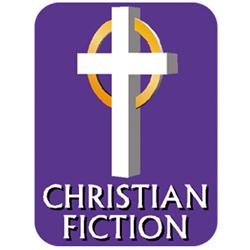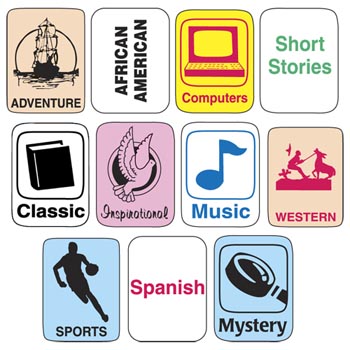QuakerQuaker
Primitive Christianity Revived, Again
What's Wrong With "Christian Fiction"?
Walking the shelves of my local library, I was surprised to find a label on a book that said "Christian Fiction." It was just above the regular label that makes books findable in the stacks.
 Topsham Public Library puts labels on fiction that say FIC, and then below that, again in caps, the first three initials of the author's last name: JAM for a book by Marlon James that I'm reading now. Across the river, Brunswick Public Library puts labels on fiction that say FIC, then below that the author's last name, below that the author's first name, and below that the first eight letters of the title. That's a little more detail, but it's essentially the same idea. Without these labels a library user would have a hard time finding a book.
Topsham Public Library puts labels on fiction that say FIC, and then below that, again in caps, the first three initials of the author's last name: JAM for a book by Marlon James that I'm reading now. Across the river, Brunswick Public Library puts labels on fiction that say FIC, then below that the author's last name, below that the author's first name, and below that the first eight letters of the title. That's a little more detail, but it's essentially the same idea. Without these labels a library user would have a hard time finding a book.
The "Christian Fiction" label, with the image of the cross, is clearly meant for a different purpose. It categorizes the book, and for certain readers calls it to their attention. In a way, it recommends it.
 This is a genre label, and I'm familiar with other such genre labels. I regularly see books with similar stickers on them that say Mystery or Science Fiction or Western or Crime. Some people stick predominantly to books in just one genre, and these labels help them find them. Publishers, I gather, have begun marketing books under the genre label "Christian Fiction," and library services companies have begun such selling spine labels. Library patrons, I understand, ask for books in the genre.
This is a genre label, and I'm familiar with other such genre labels. I regularly see books with similar stickers on them that say Mystery or Science Fiction or Western or Crime. Some people stick predominantly to books in just one genre, and these labels help them find them. Publishers, I gather, have begun marketing books under the genre label "Christian Fiction," and library services companies have begun such selling spine labels. Library patrons, I understand, ask for books in the genre.
I have no problem with a "Mystery" sticker or even one that says "Classic," even if I think the book so labelled is no such thing. So why does "Christian Fiction" give me pause?
One reason is that it has my public library recommending a book (yes, all such labels recommend) on a basis that I don't think a public library should use. Another reason is that there is no corresponding label in use that says "Islamic Fiction" or "Jewish Fiction." (I gather some libraries do label some books Jewish fiction, but not mine.) These are reasons that go to the heart of the intellectual freedom issues with which libraries regularly wrestle. The American Library Association provides professional guidance for librarians on such matters. Here's what the ALA says in recommending that public libraries not use labels like "Christian Fiction:"
What are examples for determining whether a genre label is a viewpoint-neutral directional aid or a prejudicial label?
Fiction genre labels such as romance, mystery, and science fiction are used by many libraries as viewpoint-neutral direction aids. While there may be some differences of opinion about which titles fit within specific genre areas, the choice of genre is viewpoint-neutral and does not suggest moral or doctrinal endorsement. On the other hand, some public libraries label Christian fiction with a cross as a symbol. This practice, especially when other religious fiction is not designated, communicates a message of preference for Christianity, a violation of the separation of church and state that is prohibited by the establishment clause of First Amendment as well as the Library Bill of Rights. People of all persuasions and traditions have sincere, heartfelt concerns when their government addresses religious issues, fundamentally different from an interest as to whether a library item bears a "Mystery" or "Western" sticker. In recognition of this, some libraries seek to avoid entanglement with religion by using a label to identify "inspirational fiction", including material that does not have religious-based content. As long as both the selection of materials to be so labeled and the label used are viewpoint-neutral and inclusive, this practice would not violate the Library Bill of Rights.
The most important reason I don't like the practice is something different, and it goes to the question of what those who use the label mean by "Christian Fiction." Genres have rules that authors need to respect (not necessarily follow slavishly) to make a book count as belonging in the genre. Here's one list of the genre rules of "Christian Fiction:"
Rules :
1. Accept the infallible authority of the Bible
2. Addresses life’s dilemmas through faith in Jesus
3. Believing that Jesus is divine, died, and rose again for the sins of humankind and will return again.
4. No profanity, sex, or extraneous violence
5. Characters do not have to be Christian in the beginning, but will be by the end.
I have no problem with someone writing a book that adheres to those rules. I have no problem with a publisher selling such a book or with a library acquiring it. But I do object to a public library affixing a label that says "this is what it means to be Christian." The genre label hijacks the word "Christian" for a very particular understanding of what it means to be "Christian."
No, I don't think you have to believe in the infallible authority of the Bible to be a Christian. No, I don't think you have to avoid reading about "profanity, sex or extraneous violence" to be a Christian. (I wonder, have those who promote the label read the Bible? Do they know how much profanity, sex and extraneous violence it contains?) And there's a creed implicit in those rules: I don't think you need to accept a creed to be a Christian.
I don't want my library to be subtly coaching people about what it means to be a Christian, and that's what this genre label does.
also posted on River View Friend
-
Comment by David McKay on 4th mo. 14, 2016 at 8:39pm
-
I'm sure you are well aware that the library is a dying institution seeking to reinvent itself. And that the term "Christian fiction" is the creation of publishing houses and not libraries and was created with an intent to reach a very particular marketing niche.
That niche exists because a certain style of Christianity is suspicious of fictions and entertainments. Quakerism by the way used to belong to that niche. But participants in that style of Christianity have a hunger for those entertainments and so a consumer need is created.
We can question the wisdom of that consumerism. And we can question that style of Christianity's presumption that it has cornered the market on faith.But your local library is just trying to survive.
-
Comment by Doug Bennett on 4th mo. 15, 2016 at 9:41am
-
In this case, my local library has done an excellent job of reinventing itself as a community center where many things happen including book lending. When I raised this issue with the librarians, they told me they, too, were queasy about the practice, had gone down this labelling road because a few patrons requested it, and were glad I had sketched the case against doing it. I don't know what will happen next. But I am glad the librarians are thinking this through in light of their professional norms. Survival isn't their only value, or in this case even, much in question.
-
Comment by Kirby Urner on 4th mo. 16, 2016 at 10:37am
-
I only have mean things to say about such libraries. I deleted my earlier comment as too off-color for Q2.
-
Comment by William F Rushby on 4th mo. 23, 2016 at 10:25pm
-
It really doesn't matter to me what labels libraries use on books, as long as they are polite! There is a thriving market for Amish-themed romances, and there is at least one scholarly analysis of this "sub-genre". I have read a half-dozen or more novels about observant Jews, and enjoyed them--but perhaps not as much as ethnographic studies of traditionalist Jews. I have even read at least one novel about a Jewish-Palestinian marriage and family; very interesting but a bit sad!
The few novels I have read about Friends haven't been very good, IMHO. Friends have lost their cultural distinctiveness, for the most part, and Quaker novels seem rather insipid by comparison with those related to some other ethnic communities.
Comment
Support Us
Latest Activity
In person gathering - Friends of the Light
7th mo. 22, 2023 all dayFriends of the Light - Online worship
6th mo. 4, 2023 from 7pm to 8pm
© 2023 Created by QuakerQuaker.
Powered by
![]()
You need to be a member of QuakerQuaker to add comments!
Join QuakerQuaker